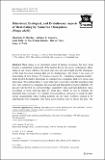Behavioral, ecological, and evolutionary aspects of meat-eating by Sumatran orangutans (Pongo abelii)
Abstract
Meat-eating is an important aspect of human evolution, but how meat became a substantial component of the human diet is still poorly understood. Meat-eating in our closest relatives, the great apes, may provide insight into the emergence of this trait, but most existing data are for chimpanzees. We report 3 rare cases of meat-eating of slow lorises, Nycticebus coucang, by 1 Sumatran orangutan mother-infant dyad in Ketambe, Indonesia, to examine how orangutans find slow lorises and share meat. We combine these 3 cases with 2 previous ones to test the hypothesis that slow loris captures by orangutans are seasonal and dependent on fruit availability. We also provide the first (to our knowledge) quantitative data and high-definition video recordings of meat chewing rates by great apes, which we use to estimate the minimum time necessary for a female Australopithecus africanus to reach its daily energy requirements when feeding partially on raw meat. Captures seemed to be opportunistic but orangutans may have used olfactory cues to detect the prey. The mother often rejected meat sharing requests and only the infant initiated meat sharing. Slow loris captures occurred only during low ripe fruit availability, suggesting that meat may represent a filler fallback food for orangutans. Orangutans ate meat more than twice as slowly as chimpanzees (Pan troglodytes), suggesting that group living may function as a meat intake accelerator in hominoids. Using orangutan data as a model, time spent chewing per day would not require an excessive amount of time for our social ancestors (australopithecines and hominids), as long as meat represented no more than a quarter of their diet.
Citation
Hardus , M E , Lameira , A R , Zulfa , A , Atmoko , S S U , de Vries , H & Wich , S A 2012 , ' Behavioral, ecological, and evolutionary aspects of meat-eating by Sumatran orangutans ( Pongo abelii ) ' , International Journal of Primatology , vol. 33 , no. 2 , pp. 287-304 . https://doi.org/10.1007/s10764-011-9574-z
Publication
International Journal of Primatology
Status
Peer reviewed
ISSN
0164-0291Type
Journal article
Rights
© The Author(s) 2011. Open Access. This article is distributed under the terms of the Creative Commons Attribution Noncommercial License which permits any noncommercial use, distribution, and reproduction in any medium, provided the original author(s) and source are credited.
Collections
Items in the St Andrews Research Repository are protected by copyright, with all rights reserved, unless otherwise indicated.

